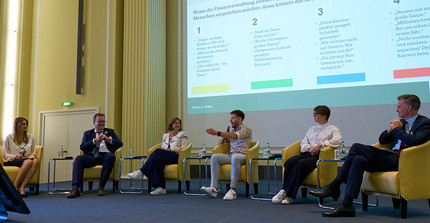An attractive civil service
Flexible, digital, well paid? How the public service of the future can become attractive again.
There is already a significant shortage of personnel in parts of the public sector, which will become even more acute in the coming years. To make the public service sustainable in terms of personnel and fit for the future, it will therefore be necessary to recruit additional skilled workers and at the same time retain them as well. Many young people find the option of becoming civil servants attractive. However, when we think of public administration in Germany, it is primarily dusty offices that come to mind.
Consequently, an attractive employer that offers flexible home office arrangements and virtual working, made possible by e-files and digitized processes, is an important building block in the battle for skilled workers. So if we want to understand what the administration of the future might look like, it makes sense to examine what preferences employees have for digital ways of working and organizing. Above all, the question arises as to the extent to which hard factors such as civil servant status, remuneration and working hours override preference selection.
What are we doing?
The project is being carried out in cooperation with the trade union youth of the "dbb beamtenbund und tarifunion". The research questions outlined above are to be answered by means of a conjoint analysis, the design of which is based on focus group interviews with young civil servants. The conjoint analysis, as a method of marketing research, makes it possible to identify the preference combinations of young civil servants that make up an attractive public service for them. The results will be complemented by a series of additional online-surveys with public employees.
With the help of the results of this study, we can contribute to enabling both the public service as an employer and trade unions to make evidence-based decisions for improved (digital) work design and organization. This will enable collective bargaining parties, politicians and society to make the public service fit for the future, so that it can hold its own in the competition for skilled workers.
Our Projectpartner: dbbjugend beamtenbund und tarifunion
As the youth organization of the dbb beamtenbund und tarifunion, dbbjugend is one of the largest trade union youth associations in Germany. It represents young public service employees between the ages of 16 and 30. In doing so, they deal with issues that move young people, e.g. youth, environmental or education policy, the future of Europe, the digitalization of the world of work or the question of more intergenerational justice. A particular focus of their work is the modernization of the state.
Link to our projectpartner
Kontakt
Nicolas Drathschmidt
Research and Teaching Associate




